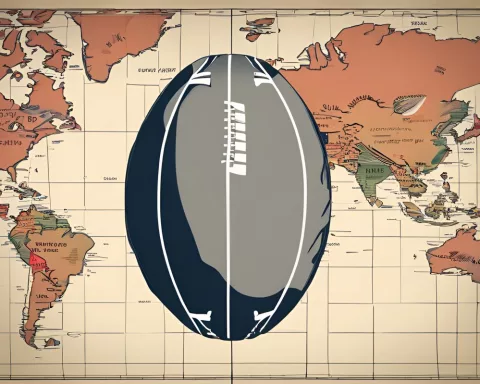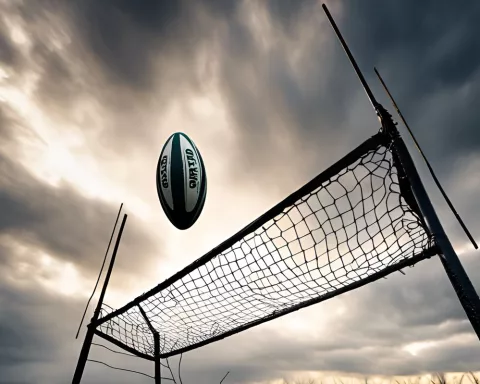Kwagga Smith is a South African rugby player who is currently playing for the Shizuoka Blue Revs in Japan. He has been instrumental in boosting the growth of rugby in Japan, with the sport’s popularity reflected in substantial game turnouts. Despite enticing offers from other countries, Smith chose to remain loyal to the Shizuoka Blue Revs due to the favorable balance between club and international rugby that Japan offers. His personal journey is a testament to the rise of rugby in Japan and his unwavering pursuit of passion.
Who is Kwagga Smith and how is he boosting rugby in Japan?
Kwagga Smith is a South African rugby player who plays as a flanker for the Shizuoka Blue Revs in Japan. His presence has been instrumental in fostering the growth of rugby in Japan. Smith notes significant enhancements in the league since the 2019 World Cup, with top-tier players intensifying the game’s competitiveness. The rise in popularity of rugby in Japan is reflected in the substantial game turnouts. Smith’s journey to Japan commenced in 2018, and his contract with the Shizuoka Blue Revs extends until the next World Cup.
Emergence of a South African Rugby Star in Japan
Kwagga Smith has been a key player in the South African rugby arena and has made significant contributions beyond his homeland’s borders. As a flanker for the Shizuoka Blue Revs in Japan, his presence has been instrumental in fostering the growth of rugby in a country traditionally entranced by soccer and baseball. As he continues to establish a legacy in the Land of the Rising Sun, Smith illuminates the evolution of Japanese rugby, his personal progression, and the future prospects of the Springboks.
Smith’s journey into Japanese rugby commenced in 2018 with his induction into the Shizuoka Blue Revs. During the ensuing six seasons, he not only solidified his place on the field but also witnessed a surge in rugby’s popularity in Japan. The 2019 World Cup, hosted by Japan, was a game-changer. Smith notes significant enhancements in the league since the 2019 World Cup, with top-tier players intensifying the game’s competitiveness.
Growth and Popularity of Rugby in Japan
The rise in popularity of rugby in Japan is clearly reflected in the substantial game turnouts. The average crowd size varies between 10,000 to 15,000, with several matches drawing over 30,000 spectators, demonstrating the country’s budding interest in the sport. According to Smith, the increasing popularity owes much to the investments by corporations owning the clubs and the arrival of world-class players such as Beauden Barrett, Aaron Smith, Ardie Savea, Brodie Retallick, and the Springboks.
In the face of enticing offers from clubs in France, the UK, and South Africa, Smith chose to stay loyal to the Shizuoka Blue Revs. His decision was influenced by his deep ties with the club, the hopeful prospects under new coaching staff, and the favorable equilibrium between club and international rugby that Japan offers. Smith states, “The key reason I remained in Japan is the number of matches we participate in and the extended breaks we receive.”
A Personal Journey and Future Prospects
Life in the tranquil countryside of Iwata, a charming town positioned between Tokyo and Osaka, has been another aspect that has made Japan appealing to Smith. He and his wife, Ilke, appreciate the slower pace and the opportunity to focus solely on rugby. Regarding the Japanese language, Smith has managed to acquire basic conversational skills, helpful for daily communication and during games, although he concedes it’s “a challenging language to master.”
However, the journey hasn’t been without hurdles. Smith incurred a groin injury in January and is currently in South Africa for rehabilitation. Despite the injury, necessitating a temporary hiatus from the game, Smith remains hopeful about his recovery. He discloses, “I’m commencing the larger part of my rehabilitation now and will likely be out for another month.”
Smith’s time in Japan is far from over as his contract with the Shizuoka Blue Revs extends until the next World Cup. Post that, he and his wife plan to return to South Africa to start a family and conclude his rugby career. As the Springboks prepare for their forthcoming match against Ireland, Smith is centering his attention on his recovery, eager to contribute to the team’s triumph once he’s back in full fitness.
Summation of Smith’s Journey
The journey of Kwagga Smith, both as a rugby player and as an individual, stands as a testament to the rise of rugby in Japan and his personal development. His experiences offer an intriguing peek into the shifting dynamics of the sport worldwide. This is a story of resilience, adjustment, and the unwavering pursuit of passion, set against the backdrop of a nation welcoming a new sport and an athlete’s embrace of a foreign land.
What position does Kwagga Smith play in rugby and for which team is he currently playing?
Kwagga Smith plays as a flanker in rugby and is currently playing for the Shizuoka Blue Revs in Japan.
How has Kwagga Smith contributed to the growth of rugby in Japan?
Kwagga Smith’s presence has been instrumental in fostering the growth of rugby in Japan. He notes significant enhancements in the league since the 2019 World Cup, with top-tier players intensifying the game’s competitiveness. The rise in popularity of rugby in Japan is reflected in the substantial game turnouts.
Why did Kwagga Smith choose to remain loyal to the Shizuoka Blue Revs instead of accepting enticing offers from other countries?
Kwagga Smith chose to stay loyal to the Shizuoka Blue Revs due to the favorable balance between club and international rugby that Japan offers, his deep ties with the club, and the hopeful prospects under new coaching staff.
What is the average crowd size at rugby matches in Japan and why is the sport becoming more popular in the country?
The average crowd size at rugby matches in Japan varies between 10,000 to 15,000, with several matches drawing over 30,000 spectators, demonstrating the country’s budding interest in the sport. The increasing popularity owes much to the investments by corporations owning the clubs and the arrival of world-class players such as Beauden Barrett, Aaron Smith, Ardie Savea, Brodie Retallick, and the Springboks.
What has been Kwagga Smith’s personal journey in Japan and how has he adjusted to life there?
Kwagga Smith and his wife appreciate the slower pace and the opportunity to focus solely on rugby in the tranquil countryside of Iwata, a charming town positioned between Tokyo and Osaka. Regarding the Japanese language, Smith has managed to acquire basic conversational skills, helpful for daily communication and during games, although he concedes it’s “a challenging language to master.”
What are Kwagga Smith’s future prospects in rugby and where does he plan to go after his contract with the Shizuoka Blue Revs ends?
Kwagga Smith’s contract with the Shizuoka Blue Revs extends until the next World Cup, after which he and his wife plan to return to South Africa to start a family and conclude his rugby career.












